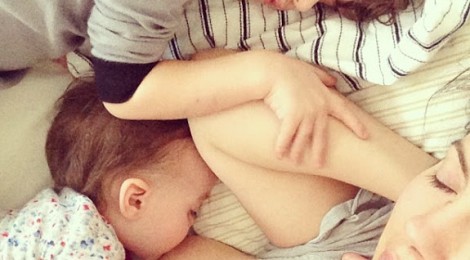
Myths That Prevent Successful Breastfeeding
Looks like I am doing a breastfeeding series. Since I wrote this as a guest post on BabyChakra I am going to post this here too.
Breastfeeding as we all know has tremendous advantages for the baby and for the mother. It can’t be compared with any other artificial method of feeding / nutrition, especially in the early months.
Somewhere in the early parts of the last century industries came into being and mothers in the West were forced to leave babies at home and go out to work. MNC’s in turn developed artificial milk or infant formula in order to give these babies good nutrition.
Over time this somehow translated into infant formula being a superior food thanks to big MNC budgets. The big guns like Nestle realized that developing and underdeveloped countries have huge potential to sell formula to even though the mother is mostly with the baby at all times by convincing families that infant milk is indeed better and healthier. Read here for more on how Nestle is guilty of being a ‘baby killer’ in poor countries.
Eventually this led to a couple of generations of women in many parts of the world who didn’t breastfeed and it went out of fashion.
Today a lot of myths abound thanks to this trend by which a lot of women stop feeding their babies prematurely. Here are some of them:
Breastfeeding is best for baby.
It’s not the best. It’s normal. It’s the only milk or food for baby and nothing else should do. If a mother thinks breastfeeding is best but Formula is the next best thing she may decide to give infant formula instead of breast milk. If she knows that there is nothing else that compares and all the hidden ingredients may cause harm in the long run she may get help, try really hard to breastfeed, and only then turn to formula.
One of the reasons that breastfeeding is essential is that babies are born with immature gut or intestines. They are pretty porous and not sealed. Breast milk seals the intestine. Formula does not. A formula fed baby may have something called ‘leaky gut’ while growing up as toxins and waste gets into a blood stream instead of staying within the intestine and getting excreted as poop. ANY amount of formula in the first 15 days is a no-no for this reason.
Baby’s insides and digestive systems are delicate and by feeding artificial foods we’re messing with those systems.
Breastfeeding is just about feeding.
This myth prevents a mother from nurturing and pacifying with her breasts when the baby seems upset or is crying. Thanks to this myth, mothers put babies on schedules.
- Mothers who exclusively breastfeed for nutrition only may not be satisfying baby’s needs for comfort and bonding at the breast.
- Babies need constant suckling. Mother takes this need to mean baby is hungry, my milk is not enough
- Pacifying baby at the breast is easier than trying several other means that fail
- Sucking is baby’s primary instinct to obtain security and nourishment.
Formula helps baby sleep at night.
Many mothers give formula at night in the hope that the baby will sleep longer. But babies who are just waking up to snuggle with mom or bond will wake up anyway. It’s not plain hunger that wakes a baby. The baby’s temperament plays a pivotal role in night waking’s. Some sensitive sleepers (like my son who has never slept more than 5 hours at a stretch in 20 months) will wake no matter what and have a hard time calming down without the caregiver. Some easy temperament babies may sleep through from 2 and 3 months whether breast-fed or not. Feeding night and day specially in the initial couple of months is essential for establishing good milk supply and most moms can easily carry on feeding for a couple of years or more if this initial supply is well established.
Breasts are never empty.
Sometimes people around the mother may tell her that it’s not possible to feed so often and still have milk, or maybe the baby is spitting up after every feed and the mother thinks of topping up with a bottle thinking the baby may feel hungry soon. But a breast is not a bottle. They are never empty and will always have milk. The more you put baby to breast the more milk you will have.
I will spoil my baby by nursing her to sleep/ nursing on demand. It’s impossible to spoil your baby firstly and specially not by breastfeeding on demand or nursing to sleep. Your breast is your baby’s home. Sometimes all he may want is some snuggling at the breast
My baby should be sleeping through the night at 3/ 6/ 9 months. Many a mother thinks that there is a particular time frame for when a baby sleeps though the night. I remember I was one of them. When I stopped worrying about it once my baby turned 8 months we all slept better even though he continued to wake up to nurse.
Mothers worry that breastfeeding is stopping him from sleeping though the night. This actually may be true. Your baby may be just waking up to nurse and bond with you when he is at his most vulnerable. But is that really a problem? It’s something only you the mother can answer.
Thanks for reading today. Hit me up with more myths that you’ve come across that prevents successful breastfeeding.


 Follow
Follow










Super post Aloka…..its so apt abt today’s moms putting formula over bf…I know only very few moms who HV ebf their babies for 6 months w/o a hint of formula.and I’m glad I could b one of them.I see a major difference in my son.I’m sure u do too.I also believe in baby led weaning for bf.its so good to read your posts and see that at least there are a few moms out there who believe in this ancient theory of bm is the best.
hey ashmi. ya i am following baby led weaning for bf and so far i know i have a long way to go! but sometimes i feel breastfeeding a toddler is every nicer than bfing a baby. they communicate and let you know how much they love it.
thanks…ur series will definitely help me think straight when the time comes…its not stressful when I realize the facts….i especially need to think its normal and not the absolute best because thats when u want to settle…
One think I have heard from my sensible friends is that the more BF u can do, the less issues the baby has with his digestive issues like colic, etc etc….
not entirely true manasa. breastfed babies can be very colicky and fussy initially too, it has more to do with temperament than breastfeeding. babies are babies. the first few weeks are hard period.
Can i just ask where the information about MNCs and formula development comes from? I don’t know much about the establishment of the formula industry but I do know that ‘dry nursing’ stems quote far back and that dry nursing mixes and bottles and tears were introduced mid-19c; I do not know of this is related to women in workforce though this was an issue during the industrial revolution, I believed they were moanky young or unmarried women. Would just like to see sources if this info is accurate. (Sorry am very pro-BF, asking as in interested in studying bf and ff trends and think formula industry has much to account for but there are other cultural factors ; hoping to do research on bf trends from 19c to present in my own country and want to see issue represented accurately).
Hi Jenna, this article talks extensively about how marketing of formula had an effect on breastfeeding. http://www.ncbi.nlm.nih.gov/pmc/articles/PMC2443254/
is this what you were looking for?
For the most part of the last century people were convinced that science and technology were superior to nature and bf started to be looked at something village bumpkins who had no money to afford the best did for their infants. That’s a cultural angle as people genuinely thought bf was something poorer strata of society did and eventually this belief spread where women even in poorer household would try to get what they believed what the best nutrition.
As formula marketing became widespread and before the organisations like ibfan http://www.ibfan.org came into being this spread to other parts of the world.
Doctors used to make their own ‘formula’ before it was standardised and branded. That’s because women started getting out of their homes and entrusting babies to wet nurses. Wet nurses sometimes didn’t breastfeed and gave infants other mixtures thus leading to deaths and wet nursing got the blame.
Unfortunately I don’t have an exact source of this information. In my training as a certified lactation educator I have come across this information in various texts and am unable to find online sources to help you.
Will keep trying ! Thanks for writing in.
Another excellent article on the subject. Jenna
http://www.bellybelly.com.au/pregnancy/baby-formula
Hi.. I’m a breastfeeding mum and my baby is 10 months and 3 weeks old.. He has begun biting me since the past week. He has started sprouting his teeth during the last one month. DO you have any tips on dealing with this. He bites more towards the end of the feeding session.
Hi you can watch the next tine this happens and consider stopping the feed just before he bites. it may happen skmetimes as you said at the end of a nursing as the supply is slow.
also end the feed immediately if baby bites andin a firm tone explain. you will be surprised how soon little babies get it.
Thankyou Aloka! Will watch out for what you said. Didn’t really want to stop feeding because of this.